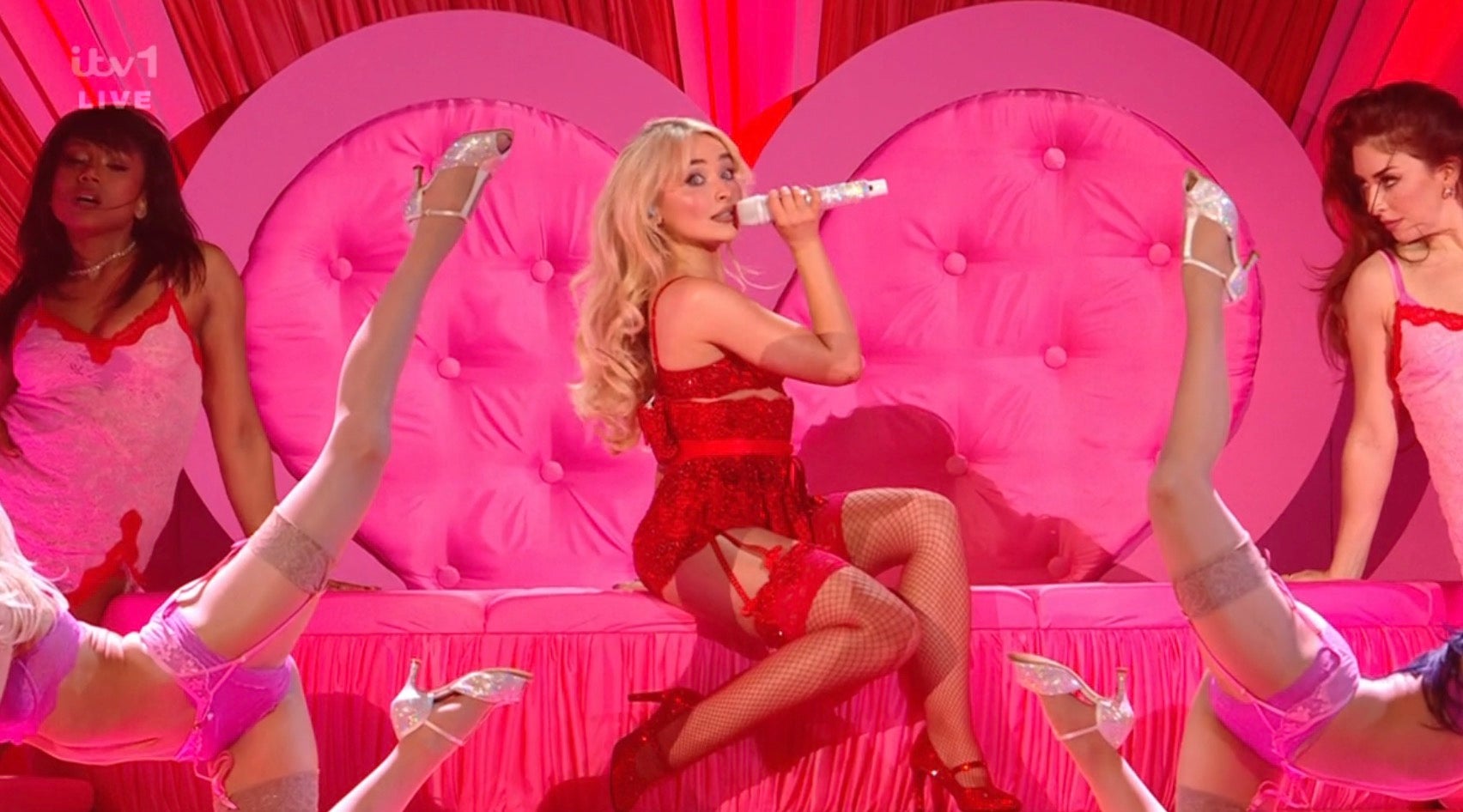ARTICLE AD BOX
Quick – someone inform the church elders! Sabrina Carpenter just released the cover for her new album and it’s a little bit provocative! The artwork in question has been branded by turns “disturbing”, “disgusting” and “triggering”, sending shockwaves through the “Espresso” singer’s fandom after she shared it on Instagram. I encountered these visceral reactions via a number of scandalised headlines before, in fact, I’d even seen the picture itself. My imagination conjured up all kinds of depraved imagery in the interim – because surely, for people to be this offended, the cover of Carpenter’s forthcoming follow-up to the Grammy-winning Short n' Sweet album must be truly reprehensible?
So it was that I clicked through to find a photograph of the 26-year-old pop star on her hands and knees, clad in a short (yet otherwise demure) black dress and looking off past the camera while a faceless person – viewers have jumped to the conclusion that it’s a man, but there’s nothing to prove that – stands to the side, loosely holding a wad of her signature blonde locks in their hand.
Look, I get it. The woman called her new album Man’s Best Friend and then there she is on the floor like… well, like a dog. There are potentially uncomfortable and sordid connotations around female submission and male dominance when you link title and image. But to come to such flawed conclusions, you’d honestly have to have zero context – to know literally nothing about Carpenter, her music or her brand.
For starters, Carpenter is not some manufactured Nineties tween pop princess whose every move is dictated by a lewd, middle-aged band manager with dollar signs in his eyes, coaxing her to squat down because “sex sells”. To suggest she doesn’t have agency on a cover that she posed for in a set-up she chose for an album full of songs she wrote seems a wilful misreading of the power dynamics at play. And it’s far smarter than its critics would have you believe; any provocation here is entirely intentional.
Carpenter is an artist who loves subverting expectations, who takes great delight in portraying a certain image one minute before playfully deconstructing it the next. Her stage persona is that of a 1950s pin-up – a doll-like Betty Boop figure, all gussied up in corsets, suspenders and sky-high heels, combining sexy silhouettes with cutesy hearts, sparkles and fur-trimmed negligees in a thousand shades of pastel. Even the way she moves when she performs is, as they say, giving Marilyn – the Monroe association strengthened all the more by her buttery-blonde bouffant curls, flicked to devastating effect. Then there are the dainty, shimmying steps and burlesque hip wriggles; the girlish smiles that flip into open-mouthed gasps of faux-shock. She is, on the surface, the archetype of every heterosexual man’s fantasy come to life: equal parts siren and naif.
But then you hear her songs. Actually listen to the words, and you realise there is nothing of the ingenue here. Every carefully crafted lyric is knowing, every song building a picture of a powerful young woman who is in control of her own sexual destiny – and yet is constantly let down by the lacklustre calibre of men on offer.
Take the cutting putdowns in the song “Dumb and Poetic”: “Jack off to lyrics by Leonard Cohen/Don’t think you understand/Just ’cause you talk like one doesn’t make you a man.” Or “Good Graces”, in which she warns her current paramour that hell hath no fury etc: “I’ll tell the world you finish your chores prematurely/Break my heart, and I swear I’m movin’ on/With your favourite athlete”. (I think we all know what she means by “chores”, and it has very little to do with taking the bins out.) Or “Slim Pickins”, wherein she laments that, while the bar is so low it’s practically on the floor, she still can’t get no romantic satisfaction: “A boy who’s nice that breathes/I swear he’s nowhere to be seen”. Amen to that, sister.
Some have criticised the more overtly sexual elements to Carpenter’s work because she has a young fanbase. The singer has famously “acted out” a different sex position during each performance of the song “Juno” during her world tour (and came under fire in particular after simulating the “Eiffel Tower” position during her Paris show). The shock factor is likely linked to Carpenter’s background as a child star – she first gained prominence in the children’s Disney Channel series Girl Meets World.
To these people I would say: firstly, she is a child no longer. Just like Christina Aguilera and Miley Cyrus before her, Carpenter can’t be expected to forever remain a girl simply to make us feel more comfortable. Secondly, no artist can choose their fan demographics; they simply create the art they feel compelled to make and hope it finds an audience. In a messed-up world in which 27 per cent of children in the UK have seen actual pornography by the age of 11, it’s laughable to waste time and energy handwringing over what amounts to fairly tame, fully clad and sex-positive tomfoolery. And, as Carpenter herself has identified, her denigrators seem far more preoccupied by sex than she is.

“Those are the songs that you’ve made popular,” she told Rolling Stone in a recent interview. “Clearly you love sex. You’re obsessed with it.”
With all this as the backdrop, it feels obvious that there’s nothing “submissive” about the Man’s Best Friend cover. Aside from the fact that she’s one of numerous solo female artists who are comprehensively dominating the music industry right now (along with Beyoncé, Taylor Swift, Chappell Roan, Charli XCX and Olivia Rodrigo), Carpenter ultimately holds all the aces in the relationship dynamics she creates within her songs. Whether it’s by effortlessly seducing the man she wants in “Espresso” or looking down at his stupidity with world-weary ennui in “Sharpest Tool” and her new single, “Manchild”, Carpenter always comes out on top. (The latter has even more bite given the song’s rumoured subject is Carpenter’s ex, Irish actor Barry Keoghan.)

If this woman is presenting herself as a dog, crawling on all fours at the behest of her “master”, you best believe it’s only to completely flip that narrative on its head. Carpenter courts the dumb blonde stereotype simply to dismantle it with a sequined wrecking ball at every turn. You only have to watch her artfully playing up to the bombshell schtick for laughs in her Netflix Christmas special or performance at this year’s Grammys to appreciate that behind the overblown coiffure lies a razor-sharp wit and knack for comedy – and she’s always in on the joke.
And, honestly, anyone who is truly offended by her relatively vanilla album cover needs to get a little bit of perspective. Maybe take a quick gander at Californian punk band NOFX’s infamous 1996 artwork for Heavy Petting Zoo before you cry “disturbing!” over Carpenter’s efforts – it features a realistic illustration of a man, ahem, intimately touching a sheep (and the vinyl version shows the pair sixty-nining).

Carpenter simply crouching down, fully dressed, seems positively PG in comparison.
At the end of the day, you can be as outraged as you like – all it does is drive more attention to Carpenter’s new album and, subsequently, more money to her bank account. She may be in the doghouse with her detractors right now, but perhaps that’s just the price you pay for being a bad b*tch.









 English (US) ·
English (US) ·